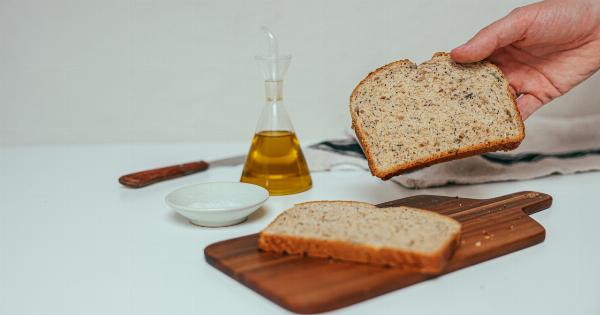Testosterone is a hormone responsible for many essential functions in men, including muscle mass, bone density, mood regulation, and maintaining a healthy sex drive.
While testosterone levels naturally decrease with age, certain foods have been found to have a negative impact on testosterone production. In this article, we will explore some common foods that can lower testosterone in men and the potential consequences of consuming them.
1. Soy-based Products
Soy-based products, such as tofu and soy milk, contain high levels of phytoestrogens, which are plant compounds that mimic estrogen in the body.
Consuming soy-based products in excess can lead to an imbalance between estrogen and testosterone levels, thereby reducing testosterone production. It is advisable to consume soy products in moderation, especially for men concerned about their testosterone levels.
2. Alcohol
Excessive alcohol consumption has been linked to a decrease in testosterone levels. This is because alcohol can disrupt the normal function of the testes, which are responsible for testosterone production.
Additionally, alcohol may promote the conversion of testosterone into estrogen, further exacerbating the imbalance between these hormones. Limiting alcohol intake is crucial for maintaining optimal testosterone levels.
3. Flaxseeds
Flaxseeds are rich in lignans, which are plant compounds that can have estrogen-like effects in the body. While flaxseeds offer numerous health benefits, consuming them in excess may interfere with testosterone production.
It is recommended to consume flaxseeds in moderation or opt for other sources of omega-3 fatty acids, such as fish or chia seeds.
4. Processed Foods
Processed foods, such as packaged snacks, fast food, and sugary treats, often contain high amounts of trans fats and refined carbohydrates.
These unhealthy ingredients can lead to weight gain, insulin resistance, and inflammation, all of which are associated with lower testosterone levels. Opting for whole, unprocessed foods is crucial for supporting healthy testosterone production.
5. Spearmint Tea
Spearmint tea has been shown to have anti-androgenic effects, meaning it may inhibit the production of androgens, including testosterone.
While further research is needed to understand the precise mechanisms, individuals concerned about their testosterone levels may want to limit their consumption of spearmint tea or opt for other herbal teas.
6. Licorice Root
Licorice root contains a compound known as glycyrrhizin, which can inhibit testosterone production and promote the conversion of testosterone into estrogen.
Regular consumption of licorice root or products containing licorice extract may contribute to lower testosterone levels. Individuals with existing hormonal imbalances should exercise caution when consuming licorice root or its derivatives.
7. Mint
Similar to spearmint tea, mint has been found to have anti-androgenic effects. This means that excessive consumption of mint or products containing mint oil may interfere with testosterone production.
While mint is commonly used in various culinary preparations, it is important to moderate its consumption, especially for individuals with concerns about their testosterone levels.
8. Processed Dairy Products
Processed dairy products, such as ice cream, cheese spreads, and flavored yogurts, often contain added sugars, artificial ingredients, and hormones. These additives may disrupt the endocrine system and interfere with testosterone production.
Opting for organic, hormone-free dairy products, or dairy alternatives may be a better choice for supporting healthy testosterone levels.
9. Vegetable Oils
Vegetable oils, including canola oil, soybean oil, and corn oil, are commonly used in cooking and food processing.
These oils are high in unhealthy fats, such as omega-6 fatty acids, which can promote inflammation and interfere with testosterone production. Choosing healthier cooking oils, such as olive oil or avocado oil, can help maintain optimal testosterone levels.
10. High-Sugar Foods
Consuming high amounts of sugar has been linked to various health issues, including obesity, insulin resistance, and inflammation. These factors can contribute to lower testosterone levels.
Limiting the intake of sugary foods and beverages, such as sodas, cakes, and candies, is crucial for overall health and testosterone production.
It is important to note that while the foods listed above may have a potential impact on testosterone levels, individual responses can vary. Some individuals may be more sensitive to these foods, while others may not experience significant changes.
Additionally, the effects of these foods may be more pronounced in individuals with existing hormonal imbalances or who consume them in excess.
To maintain optimal testosterone levels, it is essential to adopt a balanced, nutrient-rich diet that includes a variety of whole foods.
Incorporating foods that support testosterone production, such as lean meats, eggs, nuts, seeds, and leafy greens, is beneficial. Making smart food choices while avoiding excessive consumption of the foods listed above can help promote overall health and well-being.































